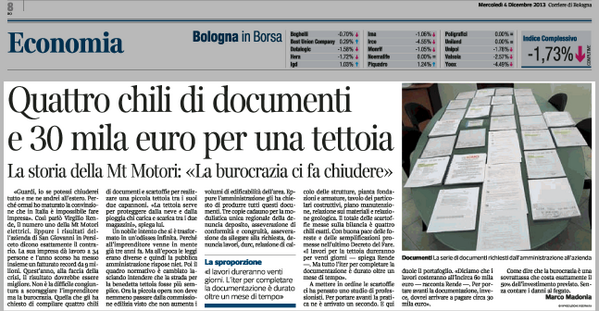A Spectre is Haunting Italy: the Spectre of Quota 100
But it could be something very different.

“Quota 100” is a pension reform launched in Italy in January 2019, that is described in English here and here. Among other things, Quota 100 would let many italian workers to retire earlier than the previous sytem would allow, starting Real Soon Now.
Exactly one month ago, a major italian newspaper wrote about the nightmare of empty offices and closed hospitals caused by “the coming of the Quota 100 quake inside Public Administration. The next paragraphs summarizes the main points of that article.
Empty offices, no services, lost skills

The italian public sector was already in dire straits before Quota 100. At the end of this five-year period, the combination of hiring freezes, other budget cuts and previous pension reforms may leave the country with half a million employees less in all services, from cadaster offices to emergency rooms.
The new thresholds provided by Quota 100 this year will sensibly worsen the situation, leading to some 100 thousands other public employees retiring earlier, some very soon.
This additional, early exodus of public servants will, very likely, paralyze many public services, or significantly decrease their quality. Small rural towns that today make do with just one clerk in their public offices may have to just close those offices. For the same reason, this month many schools are starting with less teachers than expected. In these and many other cases, the only temporary fix may be to hire precarious workers, with temporary contracts and, correspondingly, lower salaries and less benefits.
Public exams? Don’t count on them

In Italy, permanent employees in public administrations (including police, public hospitals and public schools) are hired among candidates who passed the corresponding public, official exams. There is no real solution to the problems above without new exams, but even them could neutralize the “quake of Quota 100” only partially.
One reason is timing: italian bureaucracy takes a year or more between the announcement of an exam (by state or local governments) and the declaration of its winners. And even then, those winners are actually hired only when (sometimes years later!) the offices that need them get the corresponding budget approved. But many departments are already badly understaffed today.
The other reason is more serious. So they say.
Lost in time, like tears in the rain

If new hires arrive in an office only after the former employees have retired, “a real impoverishment looms ahead for the machinery of the public administration”, because there will be no generational transfer in skills. Even if the new hires will have, almost always, a much higher level of education, the cultural heritage of those who retire will not be passed on anybody. Lost, like tears in the rain.
Tears in rain? Wait a minute…
Let’s look inside the cutural heritage of the real, current status of italian laws, regulations and many public offices:

Rube Goldberg Machines: a symbol of man's capacity for exerting maximum effort to accomplish minimal results.
</em></u>
Italy has the next to worst bureaucracy in Europe. Italy bears a Rube Goldberg burden of 235,000 regulations in total (maybe), with can result in “Four Kilograms of paperwork and 30K Euros to get a canopy approved”:

<u><em><strong>CAPTION:</strong>
<a href="https://www.padaincubo.it/" target="_blank">(For more of the same, check out PA Da Incubo)</a>
</em></u>
An awfully big lot of the competence that will be “lost, like tears in the rain” is knowledge that should, indeed, be preserved, but only for bureaucratic forensics, by occasional consultants. It is knowledge about stuff that should not be preserved: byzantine laws, regulations, procedures, red tapes, artificial bottlenecks… It is self-perpetuating departments, and sometimes whole organizations that give a bad service not because their employees retired, but because they exist. A lot of what will be aggravated by Quota 100 is stuff that should be burned to the ground, and finally replaced with something that works.
Daydreaming about Quota 100
What if Quota 100 had been only a part of one larger, coherent plan? What if the last N governments had done these things instead, in this order:
- simplify the national and regional laws. For real
- redesign the remaining bureaucratic procedures from scratch, as simple as possible (but NOT simpler!)
- redesign the contracts of public employees
- figure out how many people we will actually need to make the new “infrastructure” work
- prepare a concrete plan to pass from the old to the new system as quickly as possible
- (ONLY at this point) figure what are the best digital technologies that are actually needed to make the new system work in the most efficient way
- OK, NOW let’s see how to let people retire earlier, without making public services crash
Quota 100 may have been the straw that finally breaks the back of the camels that actually deserve it. With any luck, it may still be. At this point, these things will happen in the wrong order, of course. But if the system is completely collapsing anyway, one might as well rebuild it in a more rational way, for a change. Quota 100 may still lead to a rebirth, after a nightmare.
Who writes this, why, and how to help
I am Marco Fioretti, tech writer and aspiring polymath doing human-digital research and popularization.
I do it because YOUR civil rights and the quality of YOUR life depend every year more on how software is used AROUND you.
To this end, I have already shared more than a million words on this blog, without any paywall or user tracking, and am sharing the next million through a newsletter, also without any paywall.
The more direct support I get, the more I can continue to inform for free parents, teachers, decision makers, and everybody else who should know more stuff like this. You can support me with paid subscriptions to my newsletter, donations via PayPal (mfioretti@nexaima.net) or LiberaPay, or in any of the other ways listed here.THANKS for your support!